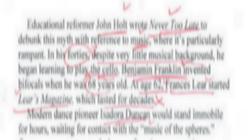Schmoozing Online with Editors
by Marcia Yudkin
"I sold my last three books to people I met in cyberspace," says Hollywood how-to author and screenwriter Skip Press. "I also got an assignment for three TV scripts for a children's science show from someone I approached online."
When Press realized that he was about to complete a book without another contract lined up, he got cracking and searched the member directory of America Online for the phrase "book publishers." That brought up about 120 self-posted profiles. "I sent 35 of those a short
email saying, 'Here's what I've done, I'm available, do you need anything written?' An editor from Prima Publishing wrote back that she liked my Hollywood background and was looking for someone to do a Hollywood version of Jeff Herman's publishing directory. I had the contract within two weeks."
|
Contrast Skip Press's success with an incident I witnessed on the other large online service, CompuServe. In a discussion forum for journalists, a guy complained that editors didn't appreciate his top-quality writing. "Most writers hand in crap," he wrote, "and editors seem to prefer it that way." Among those taking issue with his attitude was a woman who mentioned that she edited a national music magazine.
"Which one?" asked the complainer, in a different mode now, reeling off his arts publication credits.
The editor named the magazine, but later told me she'd never give an assignment to someone with such an inflated, arrogant attitude. His schmoozing landed him on the "do not hire" list.
|
|
Published! How to
Reach Writing Success
|
|
Since newspaper, magazine and book editors are active online in relatively high proportions, the Internet and online services offer new opportunities for reaching them. What I call "online schmoozing" can take several forms and yield quicker, chummier results than traditional query letters. Writers must take note of several characteristics distinguishing online communication from postal letters and somewhat more distant relatives such as telephone calls.
First, the greater informality of email
means that many editors have their guard down while plugged into the Internet. In place of carefully chosen paragraphs formatted on letterheads, a conversational, friend-to-friend tone prevails. Telecommuting editors or staffers at home after hours may be checking
email or surfing the web in their pajamas, or just feeling more relaxed than when opening mail. The result: After only a few messages back and forth,
email correspondents usually begin behaving like buddies, shortening to days a getting-acquainted process that might otherwise take months.
Second, practically everyone deals with incoming
email right away, so if you hear back at all, you'll get a reply within days if not hours. Since only one conversational sentence and a "reply" click might do the trick, rather than a whole letter and an envelope to be addressed and stamped, the usual behavior is to deal with each in-box message one after the other.
"Hollywood producers who use email
told me they prefer it over anything else," says Skip Press, who calls
email the "back door to Hollywood" because people who would never take your calls, read your faxes or open up your unsolicited script will look at a short
email from an unknown person. "They like it because they can deal with it immediately. They don't have to find a time to open up letters or read a script. They just look at the screen, say what they want to say and hit return. And they deal with it when they're ready and in the mood, not when you call."
If the idea of communicating with editors when they're in pajama mode and getting an almost immediate reply appeals to you, several avenues of getting acquainted with editors online exist.
I've had editors contact me when I posted articles or informational files on my specialty topics online. For instance, when I belonged to America Online I posted in the Writers Club an article on publicity for authors that had originally appeared in the Authors Guild newsletter. The very same editor who responded to Skip Press's "I'm available" sortie
emailed me to see if I had any book ideas for Prima Publishing.
Similarly, after I posted a Frequently Asked Questions file with questions and answers about freelancing at a
web site for writers, the editor of Inklings, a paying e-zine, asked me to answer writers' questions in a quarterly column.
This strategy works best when you position yourself as an expert on a topic and post valuable, self-contained information in an area on America Online, CompuServe or the World Wide Web already frequented by people seeking information on your topic.
Editors for, say, scuba-diving magazines visit scuba forums and
web sites as much as ordinary scuba-divers do. Your own
web site, if it highlights you as an expert on your topic, can accomplish the same goal. I don't recommend posting unsold articles and saying you're looking for takers. This makes you look like a loser.
|
Get Your First Byline -
Quickly, Easily, With Guidance
Gain personal instruction, feedback and
guidance from a coach who wants you to succeed, in
a self-paced magazine writing course for
beginners. Home-study
magazine writing course. |
Instead of posting information, you can attract the attention of editors by participating in forums and newsgroups on specialty topics. Editor Richard Lynch of Amherst, New York, was answering questions in a Photoshop newsgroup about the software program of that name, which he uses eight hours every day.
An acquisitions editor from Waite Group Press saw his postings,
emailed Lynch and asked if he thought he could write a book on Photoshop. "I guess some of my answers struck a chord. Several
emails ensued, and I'll find out very shortly whether or not I get the contract," Lynch says.
Finally, like Skip Press you can hunt down
email addresses of magazine or book editors, and forget the need to buy stamps or provide SASEs.
Writer's Market and some other media directories such as
Bacon's Magazine & Newspaper Directory now include numerous media
email addresses, and others can be found by visiting the magazines' or newspapers' or publishers'
web sites.
Beware of using this tactic just to save money and time, however. If you read listings in
Writer's Market and Bacon's closely, some editors with a listed
email address do not wish to receive unsolicited ideas that way. And some magazine
web sites display an email address for each of their editors regardless of whether or not an editor actually uses
email.
Without knowing editors' preferences, you could sabotage a proposal that would be welcomed through the old-fashioned channels, or you could send your query to a deeper black hole than the slush pile.
A few additional tips for contacting editors successfully:
- DO use your own email account, with your name set to show up in the "from" line. Getting a message announced as being from "Susan Jones" and then signed "Robert Jones" at the end is highly confusing. Sending an editor an unsigned "Hi, can I write for you?" communication from a nicknamed account like "tennisguy" is so much worse that in that case you shouldn't even expect a response.
- DO show off your writing at its best in any
email or forum message, even if you're more conversational than in a mailed query letter. Use complete sentences, look back over your spelling, make sure you've explained yourself clearly and don't use slang.
- DO keep email messages and forum postings short and focused. People don't always have patience while logged on, and too many topics bound up together increase the chances your most important point gets lost. Some recipients simply don't even open very long messages. According to Steve O'Keefe, author of
Publicity on the Internet, "email is best when brief. Brutally brief. One screenful -- three short paragraphs."
- DO remember in public postings that you never know who is and isn't looking on. Badmouth particular editors or magazines in writers' forums or
web sites at your peril. If you advertise your passion for, say, S&M or pyramid schemes in your AOL profile or newsgroup postings and use the same screen name for
email with editors, professional contacts could access that information too.
|
Get to the Point Quickly. Enuff Said?
Eliminate wordiness. Learn how to get your point across in one page or how to satisfy a strict word count for magazine or newsletter editors. Discover how to identify and cut repetition, slash excess verbiage, make your point fast and convey a wealth of facts in a small space. My longwinded clients asked for this!
Become more
concise and pithy. |
- DON'T expect subterfuge to win you points. Just as people can get angry, not impressed, when you call them on their unlisted number you're not supposed to have, using tricks to learn someone's
email address can backfire. A best-selling author told me that when one fan searched the Net for the author's husband and
emailed her care of him, she found that "sleazy" and did not reply.
- DON'T include email "attachments" when contacting anyone who doesn't know you. I know, you've just learned how to scan in and send a file of your latest clips
- but don't. Attached files in specific application programs multiply the nuisance factor for many recipients. Once you make initial contact by
email, you can fax or send your clips the usual way, or ask if sending them in an attachment is OK.
- DON'T oversell yourself. Present yourself in a low-key, without hype. Be especially careful not to send along a hard-sell "signature file" that you may have arranged to be tacked on to all your messages automatically. Many editors will find it a turn-off.
- DON'T visibly "carbon copy" editors. An editor who opens up your
email only to see in the header that you've sent the very same message to two or three competitors will look much less favorably on the contents of your message. Most
email systems have a "blind carbon copy" function that hides evidence of multiple recipients.
Copyright 2007 Marcia Yudkin. All rights reserved.
|






